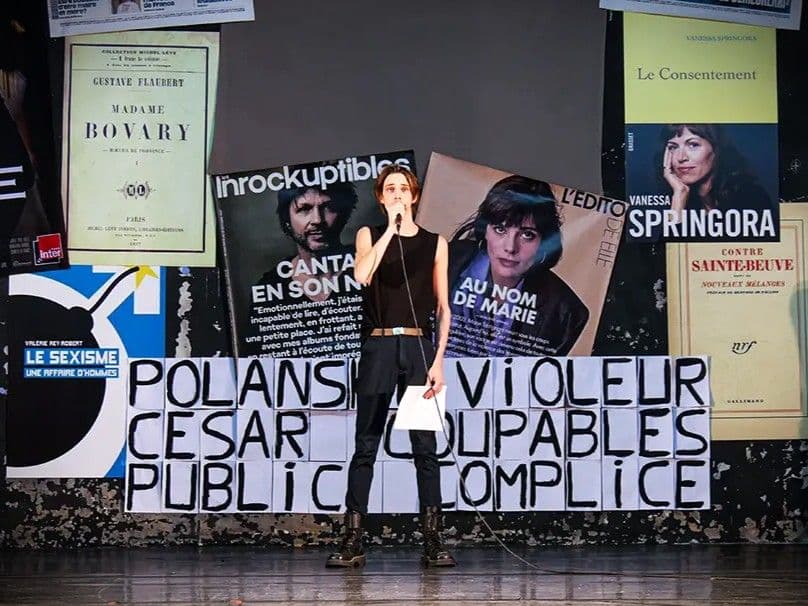"I don't see how criticism of 'great male culture' is an attack": Interview with French director Étienne Gaudillère

Can we admire a work of art without approving of its creator? This is the question posed by director Étienne Gaudillère in his latest work. Inspired by the controversy surrounding the 2020 César awarded to Roman Polanski, the play questions our collective responsibility in the face of violence in the cultural world and the persistent cult of the "untouchable artist" in artistic circles. Gaudillère takes up this challenge not by singling out an individual, but by dissecting a system that has for too long protected its tormentors in the name of "genius". With humour, rigour and profound humanity, he takes on the arguments, explores the paradoxes and calls on controversial figures to stimulate an essential debate.

Source: Wesley Pribadi on Unsplash
— Why did you choose to address this question of the relationship between the artist and his actions at a time when the scandals of violence against women in the cultural world (especially in Hollywood) are at the centre of attention?
— The starting point of the piece is the César awarded to Roman Polanski in 2020 for his film 'J'accuse' ('An Officer and a Spy'). At the time, I could feel that something was wrong, but I hadn't yet immersed myself in the subject. When I was asked to make a play about a hot topic, I thought it would be a good opportunity to address the question "Should we separate the man from the artist?" which was dominating the media at the time. Also because I could see that everyone around me had their own opinion and a lot of people, whoever they were, were a bit lost. So the idea was to go back to the basics, to the numbers, to everyone's arguments, to clarify things. All with a sense of humour.

— Did you consider any other personalities besides Roman Polanski as a starting point, or was the choice obvious from the beginning?
— That was the starting point. Then, with Giulia Foïs, the journalist with whom we created the project, we mapped out a field of research, fuelled by current events. We chose the cases according to the specific questions they raised: the case of a convicted person (Bertrand Cantat), an artist whose work is in public space (Claude Lévêque), deceased artists (Céline)... and so on. These are also the cases that come up most often in conversation. Roman Polanski is only the starting point.
— The play is not just about an individual, it is about a system. In what way do you think theatre is a good tool to get people to think collectively about these mechanisms?
— I think the strength of theatre (and therefore the play) is that it tells a story. In this case, the story of one man's realisation. I'm absolutely convinced that by telling this story - which is also emotional - we are taking the audience further.
As a social group, we happened to be in the process of creating the play when MeToo Théâtre came along. My immediate environment was at the centre of the news. The theatre is part of this system.
— What role did Giulia Foïs play in writing or balancing the story?
— Giulia Foïs wrote all her lines, which are there to recontextualise and give numbers, facts and meaning to everything we go through in the play. We also worked together beforehand on the different themes and the story we wanted to tell. It worked like a charm (we created the play in six days!). And then we update the text of the play during the tour, because we can't ignore the sometimes very recent news when we're performing.
— Do you think today's audiences are ready to hear a critique of "great male culture" without feeling attacked?
— I don't see how criticising "great male culture" is an attack. Changing things in a society where a woman is raped every seven minutes seems perfectly normal to me. If some people feel attacked, it's because they're misinformed or because such a society suits them. In this case, it's often those who want to change things who are attacked.
— As a man and a creator, how do you experience this tension between artistic admiration and ethical demands?
— I no longer have artistic admiration for artists who behave or have behaved badly. For example, reading the stories of Roman Polanski's victims no longer makes me want to watch his films. For me, it's not a question of opinion, it's a question of empathy. You can do great work without being violent, tyrannical, humiliating, etc. And there are so many artists who, frankly, I can do without.
— If the audience had to remember just one thing after seeing the play, what would you like it to be?
— As I write these lines, the Prime Minister is announcing that the French budget will have to save a further €40 billion, so I'll say this: male violence costs France €80 billion a year.